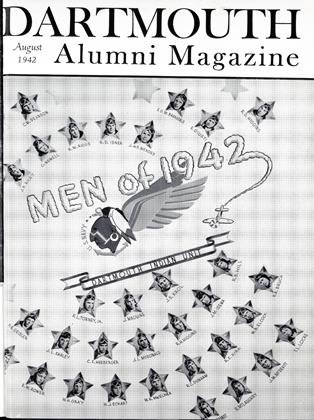DOES NOT LIFE GO DOWN with a better grace, foaming in full bodyover a precipice, than miserably straggling to an end in sandy deltas?"
A devoted member of the Dartmouth fellowship and teaching faculty, Harold J. Tobin '17, is now greatly missed in Hanover. Years ago he saw the precipice of death ahead. But his was no life of "miserably strag-gling to an end in sandy deltas." 11l health did not prevent him from meeting the terms of Stevenson's "better grace."
Harold Tobin was a symbol of the kind of man that makes Dartmouth College, or any great institution, what it is. His service was complete, fullhearted, and unstinted. He was representative of the highest talents and achievements of his colleagues on the faculty in that his classrooms were alive, his students were challenged by the breadth of studies in political science which he taught, and constant attention to his field, through writing and study and reading, was one of his notable characteristics. Undergraduate friends, and he had many, were at ease in his home where his wife, equally devoted to service in a cause, and not merely meeting the demands of a position, gave them the cordial welcome that in many cases leaves a lasting impression on an undergraduate invited to a faculty home.
He was always ready to do more than his share. Committee meetings are not apt to be exciting, nor is the work between meetings eagerly sought after by men who are, if anything, too busy to take on additional duties. He was the first chairman of the American Defense Dartmouth Group. He stayed with that project until it was firmly established at a cost of no one knows how much of the precious energy with which he was living p. life on borrowed time. But he never saved himself and it required the orders of a doctor, which had to be given at not infrequent intervals, to make him let up and secure the rest which lesser men in his situation would have placed above all other considerations. He was tireless in the affairs of his department of political science in which he had held the chairmanship. He found time for numerous other College responsibilities and community interests.
A year ago last winter he made a tour of Dartmouth alumni centers as far west as Chicago. At that early date he foresaw clearly the trend of events and was outspoken in explaining his interventionist position. His talks before alumni groups aroused lively discussion. The meetings were prolonged and were reported by interventionists and isolationists alike to be among the most stimulating of any ever held by those Associations. On that speaking trip he willingly appeared before school assemblies and luncheon groups in addition to evening meetings with Dartmouth Clubs.
When he came back to Hanover he said it had been a wonderful experience. The reports came in that meetings were superlatively good. A little later he went to Dick's House. It took a long period of rest to regain the strength that was given in that one effort which was so completely and unselfishly made for the welfare and interests of the College.
The end was probably inevitable. The doctors had said it was but his friends continued to hope that last-hour operations on his lungs would produce a miracle. They hoped and prayed right up to the moment word came that this brave and spirited life had come at last to the precipice.
Stevenson might have been writing of Harold Tobin when he said: "Every heart that has beat strong and cheerfully has left a hopefulimpulse behind it in the world, and bettered the tradition of mankind.And even if death catch people, like an open pitfall, and in mid-career,laying out vast projects, and planning monstrous foundations, flushedwith hope, and their mouths full of boastful language, they should be atonce tripped up and silenced: is there not something brave and spirited insuch a termination? and does not life go down with a better grace, foamingin full body over a precipice, than miserably straggling to an end in sandydeltas?"
THE EDITOR.
 View Full Issue
View Full Issue













